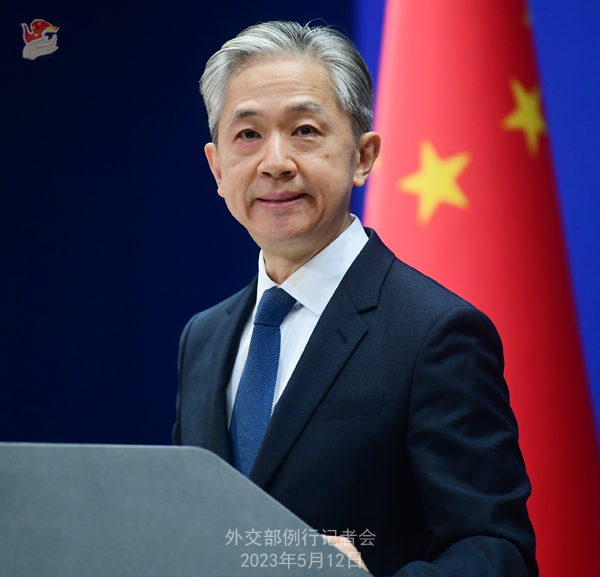Foreign Ministry Spokesperson Wang Wenbin held a regular press conference on May 12, 2023.
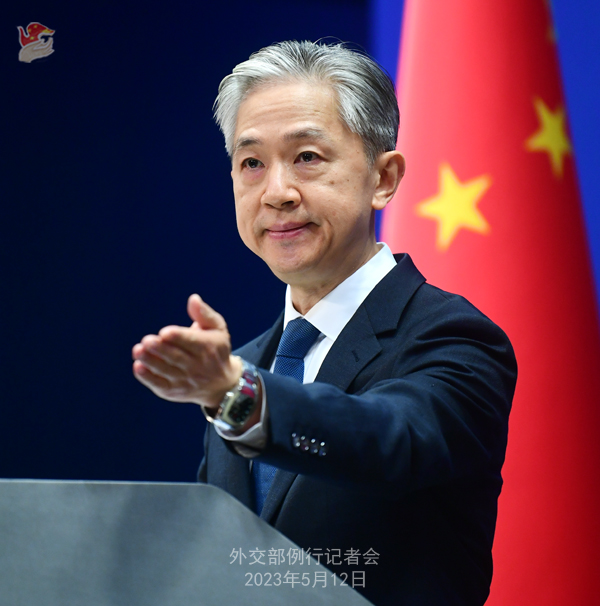
At the invitation of Ding Xuexiang, Vice Premier of The Politburo Standing Committee (PSC) and the State Council, Singaporean Deputy Prime Minister and Minister of Finance Huang Xuncai will visit China from May 13th to 17th.
At the invitation of State Councilor and Foreign Minister Qin Gang, Sierra Leonean Minister of Foreign Affairs and International Cooperation Francis will pay an official visit to China from May 15th to 18th.
Agence France-Presse: According to official reports, Wang Yi, member of the Political Bureau of the Communist Party of China (CPC) Central Committee and director of the Office of the Central Foreign Affairs Working Committee, had a meeting with Sullivan, assistant to the President of the United States, for more than eight hours, but only two short statements were issued. I have two questions: first, does this mean that the two sides have failed to reach an agreement on any key issues? Second, have the two sides discussed the possibility of holding a higher-level meeting during the upcoming G-7 summit?
Wang Wenbin: Regarding the meeting between Director Wang Yi and Sullivan, Assistant to the President of the United States for National Security Affairs, China has released a press release. On May 10th and 11th, local time, Wang Yi, member of the Political Bureau of the Communist Party of China (CPC) Central Committee and director of the Office of the Central Foreign Affairs Working Committee, met with Sullivan, Assistant to the President of the United States for National Security Affairs. The two sides held frank, in-depth, substantive and constructive discussions on promoting Sino-US relations to remove obstacles, stop falling and stabilize. Wang Yi comprehensively expounded China’s solemn position on the Taiwan Province issue. The two sides also exchanged views on the Asia-Pacific situation, Ukraine and other international and regional issues of common concern. Both sides agreed to continue to make good use of this strategic communication channel.
Xinhua News Agency: China has announced that Eritrean President Isaias will visit China. Can you tell us about the visit arrangements and China’s expectations? How does China view the current Sino-Eritrean relations?
Wang Wenbin: Eritrea is an important country in the Horn of Africa. China and Ecuador are traditionally friendly. In 2022, the Chairman of the Supreme Leader and President Isaias jointly decided to upgrade China-Ecuador relations to a strategic partnership. This year marks the 30th anniversary of the establishment of diplomatic relations between China and Ecuador. At present, political mutual trust between the two countries continues to deepen, pragmatic cooperation has yielded fruitful results, and close communication and cooperation have been maintained in international and regional affairs.
During President Isaias’ visit to China, the Chairman of the Supreme Leader will hold a welcoming ceremony and banquet for President Isaias, and the two heads of state will hold talks. Premier Li Qiang will meet with President Isaias. It is believed that President Isaias’ visit will inject new impetus into the all-round and in-depth development of China-Ecuador relations and promote the continuous progress of friendly cooperation between the two countries.
TASS news agency reporter: The EU Asia-Pacific Ministerial Forum will be held in Stockholm, Sweden on May 13th. It is reported that the forum includes not only green and inclusive development, but also Russian-related issues. Will State Councilor and Foreign Minister Qin Gang attend?
Wang Wenbin: Asia-Pacific is a hot spot for cooperation and development, not a geopolitical chess game. Any regional cooperation framework should conform to the trend of peace and development, enhance mutual trust and cooperation among regional countries, and embody openness, transparency and tolerance, instead of clinging to outdated Cold War mentality and drawing ideological lines to provoke division and confrontation.
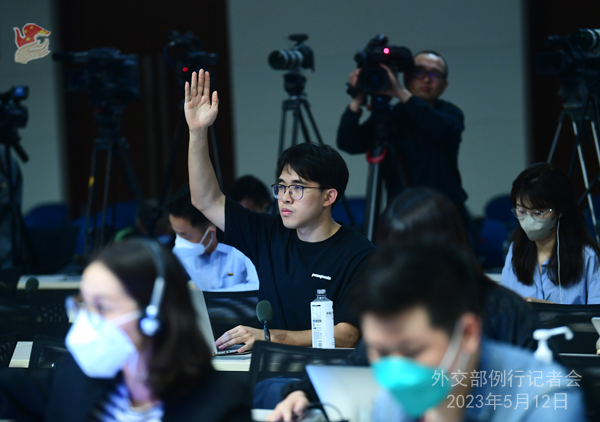
China News Service reporter: It is reported that China and the United States recently held a ceremony to return the cultural relics lost in China in new york. The United States returned two stone couches with a screen from the Northern Dynasties to the Tang Dynasty in China. What is China’s comment on this?
Wang Wenbin: On the afternoon of May 9th, local time, authorized by National Cultural Heritage Administration, China, the Consulate General of China in new york held a handover ceremony with the Attorney’s Office of Manhattan District, new york, USA. The US handed over two important lost cultural relics from China to the China government. This is the fifth time that the functional departments of the US government have returned the lost cultural relics to China in recent years, which is another cooperation between the two countries in the field of cultural heritage. It is understood that after the ceremony, China has begun to arrange related matters of cultural relics return.
China has always been committed to cracking down on and preventing the smuggling of cultural relics and protecting the common cultural heritage of mankind by expanding intergovernmental cooperation. We are willing to work with all countries in the world, including the United States, to further increase exchanges and cooperation in the field of cultural heritage protection.
Reuters reporter: Can you confirm that Chinese Ambassador to France Lu Shaye will be recalled on May 15th?
Wang Wenbin: What you mentioned is false news.
People’s Daily reporter: We have noticed that the Bruggaier Institute, a European think tank, recently released a report saying that the "Belt and Road Initiative" has withstood multiple challenges and tests in the past decade and has been widely praised around the world, especially in developing countries. What is China’s comment on this?
Wang Wenbin: We have taken note of the relevant report you mentioned. The report extracts data from mainstream media reports in nearly 150 countries, and on this basis, makes a quantitative analysis of the attention and emotional orientation of global public opinion on the "Belt and Road". According to the report, most regions in the world hold a very positive view of China’s Belt and Road Initiative.
The key to the popularity of the "One Belt, One Road" initiative put forward by the Chairman of the Supreme Leader is to always adhere to the principle of mutual consultation, joint construction and sharing. China has never imposed its own ideas on others, let alone smuggled geopolitical goods. As an open and inclusive platform for international cooperation, the Belt and Road Initiative promotes not the kind of globalization that only serves a few countries, but a more inclusive, inclusive and balanced global common development. In the face of facts, any lies and fallacies that discredit the "Belt and Road Initiative" and China’s cooperation with the co-construction countries will be shattered.
China will hold the third "Belt and Road" international cooperation summit forum this year. We will take this opportunity to work with the international community to sum up experience and draw a blueprint, continuously improve the level of building the "Belt and Road" with high quality, inject new kinetic energy and convey new hope for the world economic recovery and global sustainable development.
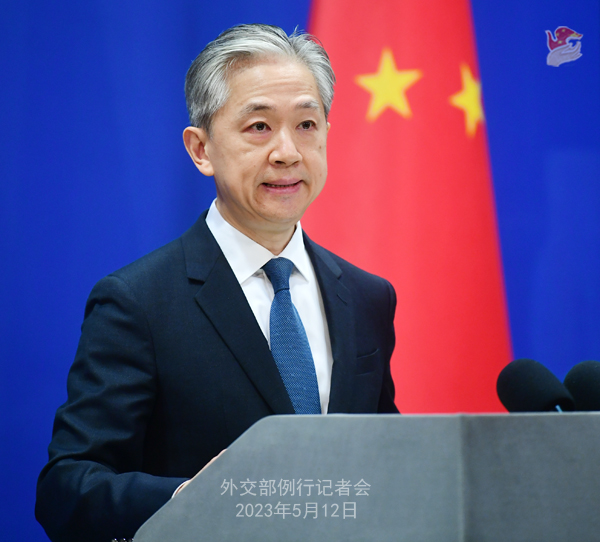
CCTV reporter: China has previously announced that it will send a special representative of the China government for Eurasian affairs to visit Ukraine and other countries. Can the spokesman elaborate on the situation?
Wang Wenbin: From May 15th, Ambassador AARON Li, Special Representative of the China Government for Eurasian Affairs, will visit Ukraine, Poland, France, Germany and Russia to communicate with all parties on the political settlement of the Ukrainian crisis.
Since the outbreak of the Ukrainian crisis, China has always adhered to an objective and fair position and actively persuaded peace and promoted talks. The "four shoulds", "four commonalities" and "three thoughts" put forward by the Chairman of the Supreme Leader are the fundamental follow-up for China to deal with the Ukrainian issue. On this basis, China issued the document "China’s Position on the Political Settlement of the Ukrainian Crisis", which embodies the above-mentioned core ideas, absorbs the legitimate concerns of all parties and has been widely understood and recognized by the international community. The visit of Chinese representatives to relevant countries is another manifestation of China’s commitment to persuading peace and promoting talks, which fully shows that China firmly stands on the side of peace.
At present, the Ukrainian crisis is still escalating, and the spillover effect continues to appear. The international community is increasingly calling for a ceasefire and easing the situation. China is willing to continue to play a constructive role, build more international consensus on ceasing fire, starting peace talks and avoiding escalation of the situation, so as to make China contribution to the political settlement of the Ukrainian crisis.
Reuters: Can you confirm that State Councilor and Foreign Minister Qin Gang will visit Australia in July?
Wang Wenbin: China and Australia maintain contact and communication at all levels. I have no information to offer about the matter you mentioned.
Beijing Daily reporter: State Councilor and Foreign Minister Qin Gang recently visited France. Can the spokesman brief us on the situation?
Wang Wenbin: On May 10th, local time, State Councilor and Foreign Minister Qin Gang held talks with French Foreign Minister Collonna in Paris, and held consultations with the leaders of the high-level exchange mechanism between China and France. During the visit, State Councilor Qin Gang also met with Bona, foreign affairs adviser to the French President, and unveiled the "China House" in the Paris International University Town.
State Councilor Qin Gang said that President Macron’s state visit to China was a complete success. The two heads of state unanimously agreed to take the 60th anniversary of the establishment of diplomatic relations between China and France next year as an opportunity to comprehensively restart exchanges and cooperation in the fields of culture, education, science and technology, and push Sino-French relations to a new level. China is willing to work with France to implement the important consensus reached by the two heads of state, accelerate exchanges and cooperation in various fields, and promote the continuous development of a close and lasting comprehensive strategic partnership between China and France.
State Councilor Qin Gang pointed out that China and France, as ancient countries with splendid civilizations, have the responsibility to promote mutual respect and tolerance among cultural civilizations, eliminate estrangement and prejudice, and sow the seeds of peace in the hearts of people all over the world. This is also the original intention of the Supreme Leader’s Chairman’s global civilization initiative. The two sides should make good use of the high-level exchange mechanism for other people’s languages, further deepen cultural exchanges between the two countries and enhance mutual understanding among the people. It is suggested that the two sides focus on promoting cooperation in sports, education, language, scientific and technological innovation and tourism.
State Councilor Qin Gang emphasized that China has always regarded Europe as a comprehensive strategic partner, supported Europe to strengthen its strategic autonomy and play an active role in the international arena, and advocated that China-EU relations should not be directed against, attached to or controlled by a third party. China, France and China should achieve win-win cooperation in expanding two-way opening up and build a more stable and mutual trust China-EU supply chain partnership.
French Foreign Minister Collonna said that France-China relations are of vital importance, and the two heads of state have made clear the direction. Both sides should make joint efforts to promote greater development of bilateral relations. It is suggested that the two sides comprehensively restart cooperation mechanisms in various fields. France is willing to work with China to plan the celebration of the 60th anniversary of the establishment of diplomatic relations. The French side attaches importance to its economic relations with China, believing that such relations are interdependent, mutually beneficial, complementary, open and transparent. The French side does not engage in camp confrontation and believes that all countries should live in harmony and develop together. China plays an important role in world peace and stability, and France is willing to strengthen communication with China on major international and regional issues and seek more common ground.
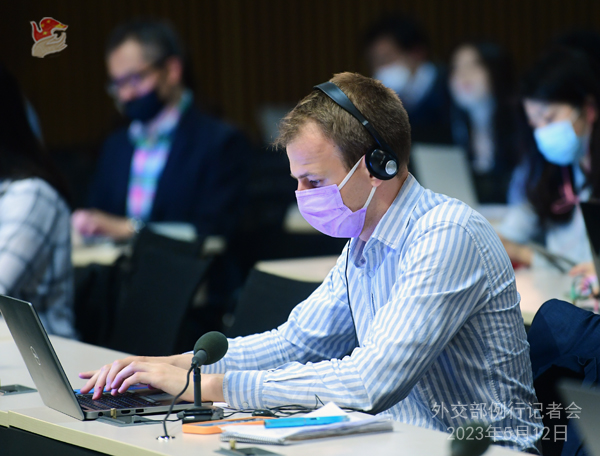
China Journal reporter: Not long ago, the House of Representatives of the United States Congress passed the "China is not a developing country bill", demanding that the United States and the State Council exert influence on international organizations to cancel China’s status as a developing country. Recently, the United States will propose another resolution to oppose China’s status as a developing country in the WTO. Some commentators believe that this move by the United States is to put its domestic law above international law in order to suppress and contain China. What is the spokesman’s response to this?
Wang Wenbin: China is recognized by all as the largest developing country. The United States wants to send China a "developed country" hat. Sorry, China can’t wear this hat.
As a developing country, China has sufficient factual basis. In 2022, China’s per capita GDP was US$ 12,741, which was 1/5 of that of developed economies and only 1/6 of that of the United States. In 2021, the per capita gross national income of China ranks 68th in the world, and the human development index ranks 79th in the world, which is equivalent to that of major developing countries.
China is a developing country with a solid foundation in international law. China’s status as a developing country has been recognized by international treaties including the mechanism of the World Trade Organization, the United Nations Framework Convention on Climate Change and the Montreal Protocol on Substances that Deplete the Ozone Layer, and has been accepted by the vast number of members of the international community. China’s status as a developing country cannot be denied.
For a long time, China has fought side by side with the developing countries in Asia, Africa and Latin America in the struggle for national liberation, and supported each other in the process of promoting national development, vividly explaining what a friend in need is. The two sides have long been a community of shared destiny. China will never join the "rich club" in the west, and will always work with developing countries to strive for common rights and safeguard common interests. As the Chairman of the Supreme Leader pointed out, China will always be a member of the big family of developing countries.
I would also like to emphasize that maintaining the status of a developing country is China’s legitimate right. China does not regard developing country status as a "shield" to evade international responsibilities or a "stepping stone" to obtain special preferential treatment, but actively makes more China contributions to promoting world peace and development. From 2013 to 2021, the average contribution rate of China to the world economic growth was 38.6%, which was higher than the sum of the contribution rates of the G7 countries. China took the lead in achieving the UN Millennium Development Goals, contributing more than 70% to world poverty reduction, and has become the second largest contributor to the UN and the second largest contributor to peacekeeping. In the WTO, the terms of special and differential treatment actually enjoyed by China are far below the average level of developing countries.
Whether China belongs to a developing country is not up to the United States. The United States has spread all kinds of false arguments and tried to deny China’s status as a developing country. Its real intention is nothing more than suppressing and containing China’s development space, making China shoulder the burden and responsibility, provoking friendly relations between China and developing countries, and interfering with and delaying the momentum of the group rise of developing countries. But China and the developing countries will not be taken in by the United States. China will firmly safeguard its status as a developing country, vigorously deepen solidarity and cooperation with developing countries, unswervingly strive to improve the representation and voice of developing countries in the international governance system, and firmly defend their legitimate rights and interests.
Hubei Radio and Television reporter: It is reported that Japanese Foreign Minister Lin Fangzheng and NATO Secretary-General Stoltenberg confirmed in media interviews that the two sides are holding consultations on NATO’s opening a liaison office in Japan. What is China’s comment on this?
Wang Wenbin: NATO has repeatedly stated publicly that its position as a regional alliance has not changed and it does not seek a geographical breakthrough. The Asia-Pacific region does not belong to the geographical category of the North Atlantic, and there is no need to establish an Asia-Pacific version of "NATO". However, NATO has continuously strengthened its relations with Asia-Pacific countries, persistently moved eastward into the Asia-Pacific region, intervened in regional affairs, and provoked camp confrontation. What is its intention? This has aroused the high vigilance of the international community, especially countries in the Asia-Pacific region. I hope that relevant parties will not undermine regional peace and stability by seeking so-called geographical interests.
At the same time, the outside world is also very concerned about whether Japan really wants to act as NATO’s "Asia-Pacific" Depth Charge. Asia is a highland of peace and stability, a hot spot for cooperation and development, and should not be a arena for geopolitical competition. Due to the history of modern militaristic aggression, Japan’s military security trend has always been concerned by Asian neighbors and the international community. We urge Japan to earnestly learn from the lessons of history, adhere to the path of peaceful development, and not do anything that undermines mutual trust among countries in the region and undermines regional peace and stability.
Reporter: According to reports, people familiar with the matter said that G7 member countries will announce a joint response to economic coercion in order to send a signal to China. What is China’s comment on this?
Wang Wenbin: When it comes to economic coercion, I’m afraid the United States is the first one who should be condemned. The United States has repeatedly generalized the concept of national security, abused export control measures, and adopted discriminatory and unfair practices against enterprises in other countries, which seriously violated the principles of market economy and fair competition.
According to media reports, from 2000 to 2021, US foreign sanctions increased by 933%. The Trump administration alone has implemented more than 3,900 sanctions in four years, which is equivalent to waving a "sanctions stick" three times a day on average. By fiscal year 2021, the United States has imposed more than 9,400 sanctions. The United States has imposed unilateral economic sanctions on nearly 40 countries in the world, affecting nearly half of the global population.
In fact, other members of the G-7 are not immune to the economic coercion and bullying of the United States. Toshiba in Japan, Siemens in Germany, Alstom in France and other enterprises have all been the targets of US suppression. If the G7 summit wants to put "dealing with economic coercion" on the agenda, I suggest that we can discuss what the United States has done first. When hosting the G7 Summit, can Japan express some concerns to the US on behalf of other member countries that are also bullied by the US? Or at least tell the truth?
China itself is a victim of economic coercion by the United States, and we have always resolutely opposed economic coercion by other countries. We urge the G-7 to conform to the trend of openness and tolerance, stop engaging in closed and exclusive "small circles" and stop being accomplices and accomplices in economic coercion.
